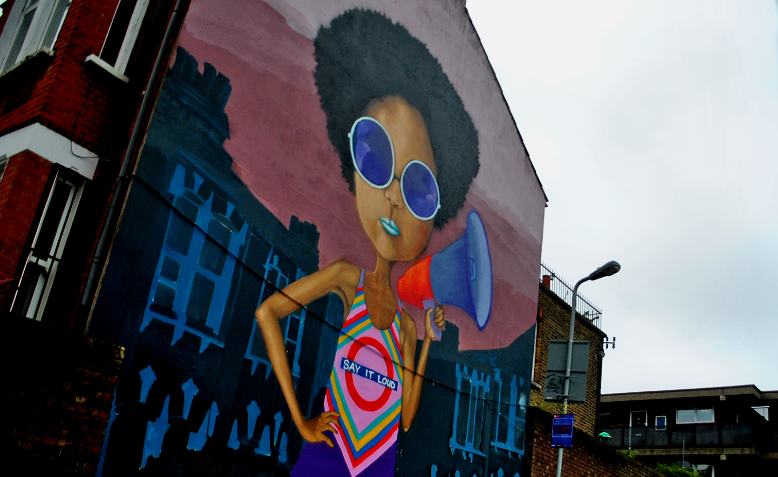 Olive Morris mural by Breeze Yoko. Photo: Wikimedia Commons
Olive Morris mural by Breeze Yoko. Photo: Wikimedia Commons
In the week Olive Morris would have turned 68, Julie Al-Hinai remembers the radical black activist and her contribution to the movement
During her short but extensively active life, Olive Morris was to draw world attention to the intersectionality of race, class and gender, rooted in the rights to adequate housing for all. A battle that she started in the late 70s and one which transcends the last 50 years and remains just as urgent in today’s impoverished and neglected inner-city communities facing the ravages of gentrification and social cleansing.
Born in Jamaica in 1952, Olive Morris migrated to London at the age of nine and studied at the University of Manchester. She embraced a radical political ideology very early on, exemplified by her involvement in the British Black Panther Movement, where she was said to have brought a particular political perspective that addressed the needs of ordinary Black people in the community. Her activism helped to develop a coherent political ideology which made clear links to other anti-imperial organisations. Remembered with affection and humour, as a “Big Person” of 5ft stature, she worked tirelessly with women’s organisations such as the Organisation of Woman of African and Asian Descent and the Manchester Black Women’s Cooperative. She was passionately concerned, and politically active, in both education and the politics of housing, particularly in relation to black communities.
Her fierce activism coincided with the increasing difficulty, particularly faced by the relatively recently arrived Black and Asian workers, in obtaining adequate housing which had always been challenging, but by the early 1970’s had become critical. As a mostly political move, she along with her compatriots and as part of the emerging anarchist movement, became increasingly interested in squatting as an alternative. Morris believed in “squatting as Politics”. She and her sister squatted a property at 121 Railton Road in Brixton and which soon after housed meetings for a variety of radical Black organisations, later to become the site of an anarchist centre and Sabarr bookshop, possibly the first Black bookstore in the UK. The iconic Squatter’s Handbook of 1979 pictures the tiny stature of Olive, climbing through a window to secure the right to squat the property legally.
Morris’s dedicated commitment to promoting the Human Right of ‘housing for all’ and acknowledging the State obligation, was only matched by her dedication and passion towards ensuring meaningful education for Black people. On Moss Side, she is best remembered for her advocacy and support for Manchester Black Women’s Co-operative, in addressing gender-based inequalities and helping mothers to improve the conditions and quality of education for their children. Led by her, they campaigned for a supplementary school and a Black bookshop. Just as important was her work with other global struggles against injustice and inequality. She was to draw a clear connection between peoples of the Global South and the White working classes. A connection that is now often overlooked in our current divisive, global political environment.
No doubt however, Morris is best remembered for her work in Brixton where her memory is honoured in the Olive Morris Memorial Collection in the Lambeth archives and the naming of a Lambeth Council building that specifically deals with customer enquiries. More recently the Remembering Olive Collective has been formed and consists of young Black women determined to discover and expose Morris’s extensive activism and to honour her memory as an inspiration for future generations of Black people, especially women. Perhaps not strangely, Olive Morris’s involvement in the anarchist movement as a whole and in particular the squatter movement, has been largely overlooked.
Sadly, Olive was to die from cancer at the early age of 27. No doubt she would not be sleeping peacefully if she were to be aware of the more recent levels of gentrification that has seen the communities that she loved and tirelessly fought for, decimated by private capital developers and leaves affordable housing ever more elusive. Nor yet a decolonised and fit for purpose education curriculum that works to progress and promote an inclusive and multi-cultural modern-day Britain where Black children stand a chance equal to their White peers and both Black and White children learn the role and ravages of Empire in their history.

Olive Morris (1952-1979)– Radical, Activist, Advocate, Anarchist, Black Panther, Political Campaigner, Internationalist, Educationalist, Woman and Squatter epitomised the struggle of Black Lives Mattering.

